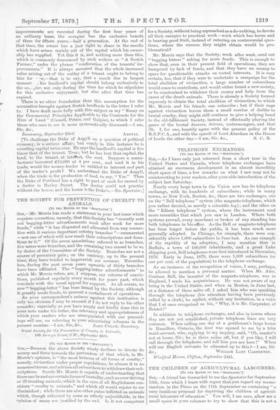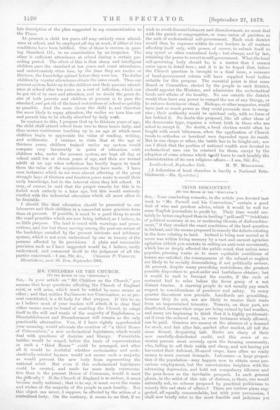THE CHILDREN OF AGRICULTURAL LABOURERS..
(TO TRH EDITOR OF THE "SPECTATOR."] SIR,—A friend has forwarded to me the Spectator for September 13th, from which I learn with regret that you regard my memo- randum in the Times on the 11th September as containing "a very insidious proposal for depriving the children of agricul- tural labourers of education." You will, I am sure, allow me a small space in your columns to try to show that this is not a fair description of the plan suggested in my communication to the Times.
At present, a child ten years old may entirely cease attend- ance at school, and be employed all day at work, if either of two conditions have been fulfilled. One of these is success in pass- ing Standard III., in an examination by an inspector. The other is sufficient attendance at school during a certain pre- ceding period. The effect of this is that sharp and intelligent children pass the standard at ten years and ceu.se attendance, and unfortunately often lose, by the time they are twelve or thirteen, the knowledge gained before they were ten. The duller children by regular attendance obtain the same result. Thus our present system holds up to the children and their parents atteud- ance at school after ten years as a sort of infliction, which can be got rid of by care and attention, and no doubt the great de- sire of both parents and children at present is to pass the standard, and get rid of the hated restrictions of school as quickly as possible. And the more clever the child is, and therefore the more likely to repay attention, the earlier we turn him out and permit him to be wholly absorbed by daily work.
In contrast to this, I propose that up to thirteen years of age, the child shall attend school from two to three hours daily, and thus secure continuous teaching up to an age at which most children begin to appreciate the value of reading, writing, and arithmetic. I venture to state that at the ago of thirteen years, children trained under my system would compare very favourably in point of education with children who, under the present system, are kept all day at school until ten or eleven years of age, and then are turned adrift at an age when reflection has hardly begun to teach them the value of the acquirements they have made. I have seen instances which to me were almost affecting of the great struggle boys of thirteen and fourteen years make to recall their early knowledge, lost in the interval since they left school. It may, of course, be said that the proper remedy for this is to forbid work entirely to a later age, but this would seriously conflict with the industrial education which all must allow to be desirable.
I should like that education should be presented to our labourers and their children in a somewhat more gracious form than at present. If possible, it must be a good thing to avoid the cruel penalties which are now being inflicted, as I believe, to so little purpose. The laud is vexed with warnings and prose- cutions, and few but those moving among the poor are aware of the hardships entailed by the present intricate and arbitrary system, which is not even understood by one in twenty of the persons affected by its provisions. A plain and reasonable provision such as I have suggested would be, I believe, easily understood, and commend itself to the judgment of all the



































 Previous page
Previous page